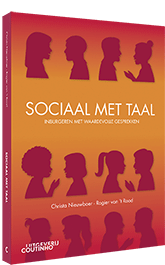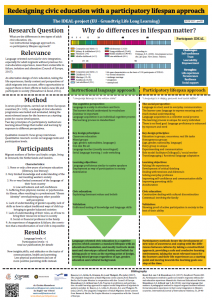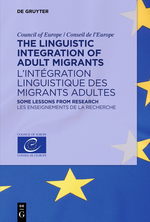
In 2022 we published a Dutch handbook for practitioners and participants on participatory civic education. Two articles in English will follow soon.
https://www.der-paedagogische-blick.eu/
Participatory approaches in adult civic education: new practices based on lessons learned (2022)
Nieuwboer, C., PhD. Professor Youth Family & Society, Avans University of Applied Science, cc.nieuwboer@avans.nl
Rood, Rogier van ‘t., PhD. International consultant on educational improvements, Vantrood Educational Services vantrood@vantrood.nl
In this article in Der Pädagogische Blick the main principles, a good practice and a new guidebook are introduced (fall, 2022).
Abstract
The design of civic education programs in Europe has been subject to many influences, not in the least political ones. Integration policies have become more strict and conditional over the course of two decennia (Goodman, 2015), despite several recommendations and resolutions made by The Council of Europe to develop inclusive practices (Council of Europe, 2022). Public and media discourses provide a problematic view on migrants and integration (Goodman & Kirkwood, 2019), leaving vulnerable groups stigmatized as unwilling and consequently underserved. However, from a pedagogical point of view, underprivileged groups in society need specific attention and support in their efforts to participate in a new society. Educational courses that exist to support migrants in their efforts to participate in a host society should be properly designed with pedagogical expertise. A participatory lifespan approach has been developed and practiced for the last twenty years and is now available in a practical handbook and workbook in the Netherlands.
References
Beacco, Jean-Claude, Chris Hedges & David Little. 2014. Linguistic integration of adult migrants: Guide to policy development and implementation. Strasbourg: Council of Europe. https://rm.coe.int/CoERMPublicCommonSearchServices/DisplayDCTMContent?documentId=09000016802fc1cd. Accessed July 16, 2022.
Council of Europe, Official texts., https://www.coe.int/en/web/language-policy/official-texts. Accessed July 16 2022.
Freire, P. (1994). Pedagogy of hope: Reliving pedagogy of the oppressed. New York: Continuum.
Goodman S., Kirkwood S. (2019). Political and media discourses about integrating refugees in the UK, European Journal of Social Psychology, 49/(7), 1456-1470
Goodman, S. (2015). Conceptualizing and measuring citizenship. Comparative Political Studies, 48(14): 1905-1941.
Lange, A. de (2018). Prototyping Policy for Participation: An experience-based game that stimulates an intercultural dialogue about the dutch core values. Delft University of Technology. Retrieved from https://repository.tudelft.nl/islandora/object/uuid%3Ad8f0fc40-abe1-463f-8512-cb0115c7e0e8
Nieuwboer, C. C. & Rood van ‘t, R. A. (2022). Sociaal met taal. Inburgeren met waardevolle gesprekken. Coutinho, Bussum.
Nieuwboer, C.C. & Rood van ’t, R. A. Progress in proficiency and participation. An adult learning approach to support social integration of migrants in western societies. In: Beacco, J.-C., Little, D., Krumm, H.-J. and Thalgott, Ph. (eds.) (2017), The Linguistic Integration of Adult Migrants: Some Lessons from Research. Berlin: De Gruyter Mouton in cooperation with the Council of Europe. Retrieved from: https://www.degruyter.com/view/books/9783110477498/9783110477498-027/9783110477498-027.xml
Nieuwboer, C.C. & Rood van ’t, R. A. (2016). Learning language that matters. A pedagogical method to support migrant mothers without formal education experience in their social integration in Western countries. International Journal of Intercultural relations, 51, 29-40
Rood van ‘t, R.A. & Nieuwboer, C.C. (2017). Handbook Themis-IDEAL. Participatory method to guide non-western migrants without formal education experience. Retrieved from: https://ideal-participation.eu/site/2017/04/06/ideal-handbook-2017/
Rood van ‘t, R.A. (1997). Empowerment through Basic Education, a foundation for development; CESO-paperback 26, Nuffic, The Hague
Krumm, Hans-Jürgen & Verena Plutzar. 2008. Tailoring language provision and requirements to the needs and capacities of adult migrants. https://rm.coe.int/CoERMPublicCommonSearchServices/DisplayDCTMContent?documentId=09000016802fc1c8 Accessed July 16, 2022
Vygotsky, Lev S. 1978. Mind in society: The development of higher psychological processes. Cambridge, MA: Harvard University Press.
 Language is essential for participation. No wonder that language plays an important part in adult civic education and requirements for naturalization.
Language is essential for participation. No wonder that language plays an important part in adult civic education and requirements for naturalization.
Researchers distinguish roughly two methods of language learning: the cognitive and the social approach. These approaches contain fundamental differences in design, objectives and validation, as well as its relation to civic education.
On this poster (made for the European Conference on Developmental Psychology, 2017) the different perspectives are explained on the basis of courses for female non-western migrants without formal education experience in the Netherlands, Sweden and Denmark. Their lifespan was very different from the current European lifespan. They experienced course-blocking in traditional language/civic courses and made progress in participatory courses.
Learn more about the two perspectives on language education by clicking on the miniature poster (pdf).
 Themis Ideal Handbook-for-implementation
Themis Ideal Handbook-for-implementation
This handbook describes in detail the relevance, background and methodology of IDEAL, the implementation modalities, characteristics of the target group, and opportunities and limitations of the approach. A summary evaluation of the pilots and lessons learned are included. It provides for extensive instructions and recommendations on implementing IDEAL in adult education for the target group in Europe, and to make it fit to local conditions and circumstances. Also the necessary competences and attitudes of IDEAL teachers are outlined extensively. Instruments for measuring progress are included as well: on language acquisition and on progress on levels of participation, for baseline and evaluation purposes. Finally it includes references, and advices on additional and follow up activities.
 This book reflects the contributions to a conference on Linguistic Integration of Adult Migrants (Council of Europe, 2016).
This book reflects the contributions to a conference on Linguistic Integration of Adult Migrants (Council of Europe, 2016).
Chapter 4, p. 201-206
Abstract:
Educational courses that exist to support migrants in their efforts to participate in a host society should be properly designed with pedagogical expertise. In this paper, we clarify basic principles of adult learning, using the Themis method as an example. Instead of a fixed curriculum which aims to teach dominant and stereotypical cultural habits, a participatory approach fosters the development of new kinds of awareness and new ways of coping with the differences between cultures, and leads to more profound results in terms of self-confidence, participation, empowerment and language proficiency.
Christa Nieuwboer & Rogier van ’t Rood
Nieuwboer, C.C. & Rood van’t, R. Progress in proficiency and participation. An adult learning approach to support social integration of migrants in western societies. In: Beacco, J.-C., Little, D., Krumm, H.-J. and Thalgott, Ph. (eds.) (2017), The Linguistic Integration of Adult Migrants: Some Lessons from Research. Berlin: De Gruyter Mouton in cooperation with the Council of Europe.

Current civic integration courses are mostly language and knowledge-based and do not take the complex efforts into account that migrants face whilst building a new life in a foreign society. Since 2002, Vantrood Educational Services is researching and developing methods for psycho-social adult learning, focusing on a double context approach: the receiving society, as well as the adult migrant learner. In this position paper, we describe the theory-base of principles of this effective pedagogical approach and discuss assumptions of adult learning and civic integration in order to define constructive future directions.
position-paper-on-social-integration-of-adult-migrant-learners_def

Recent referenda and elections, like the EU-referendum in the United Kingdom of June 23d, show that fear of migrants provokes an open jump shot in public debate. At a recent family meeting, the solution to ‘stop migrants’ was almost victoriously expressed by some of the attendees. But when I asked: “So what do you contribute to a healthy and happy society”, it appeared to be a brutal conversation stopper.
This column is a personal and professional cry from the heart.
I am one of the persons who works for social integration for many years now. It feels like an increasingly difficult job to do. In itself, it is a challenge, since it is important to find nuance and precision; social integration is a complex and lengthy (probably never fully achievable) effort. It becomes even more challenging when hindered by fast sentiments like fear. There is a lot of work to be done, both in research and in practice, and this is best done by both careful consideration and passion for people. This is not a game of footy, not a battle for the best and really not a game at all. It’s about working with people, with the safety of future generations as the ultimate objective. People like me aren’t even on the playing field. Sadly, that leaves the goal wide open and we lack an offensive line to counter wild attacks. Some politicians profit as they suggest easy solutions: boundaries, walls, barbed wire. Open jump shot.
Meanwhile, the referendum in the UK shows that there is a gap between remain-voters (younger, higher educated, more international exposure) and exit-voters (older, lower educated, more locally oriented). That is not a coincidence. The motivation to let a vote be determined by fear, anger and uncertainty is similar to autonomy, but it lacks the essential counterbalance: responsibility. The suggestion of quick fixes to gratify basic needs may seem tempting, but it is no more than a relief of tensions and has little to do with the deeper values in life: morality, sincerity, altruism. Also, in order to create long term solutions we need higher thinking skills like analysis and evaluation. People with higher education are mostly well trained to apply these skills in a broader context and using reflection on different perspectives. What’s more, they rely on these capabilities to find future directions in complex issues.
We are able to find lasting solutions for a number of issues in social integration, for instance in education and parenting. We are making progress. Such efforts take time. I feel encouraged by lots of people who work hard to make this happen, highly motivated and persistent, but the current political climate is discouraging. Instead of investing in lasting solutions, ad hoc solutions are being proposed, pretending that they are feasible. When do we admit that we are in the midst of a fundamental social climate crisis?
My daughter, who is 16, cried bitter tears over the Brexit-result this morning. She loves Great Britain and has plans to study in England. She so much hoped migrants would not be bashed by this vote yet again. But most of all, she hurts because her trust in humanity is suffering badly. She witnesses the victory of the fast and negative sentiments over the slow and positive ones. She witnesses the dominance of the extraverts over the introverts. As a parent, I want to show her that constructive hard work for all our mutual benefit is more worthwhile than hate, fear and exclusion.
We should ask ourselves: are we, as a civilised species, building a future for generations to come? Are we still scoring points on that one?
Dr. Christa Nieuwboer
Senior researcher on pedagogics and parenting support, the Netherlands
PS. My daughter approved of this column and praised my use of English 🙂
Thursday March 31, 2016.
Participatory adult learning methods are well-known in developing countries, but they are lacking in the array of integration programmes in Europe. Most linguistic oriented courses are not
suitable for low educated and illiterate migrants without work, which leaves certain vulnerable groups deprived of adequate support for social integration. Such courses lead to course-blocking, frustration and low self esteem.
The pedagogical approach of IDEAL is fundamentally different from linguistic courses and has two imperatives: learning language that matters and exposing learners to different perspectives on topics that are highly relevant to them, such as health and parenting. The programme fosters change towards social integration and tolerance for diversity, which is feasible through sharing narratives and role modeling.
Evaluation shows that participants’ language acquisition and their participation level have improved after completing the programme.
Find our presentation here: Presentation COE 2016
We recently published this article about IDEAL/Themis in the Journal of Intercultural Relations (Elsevier).
Hyperlink > to the full text article (open access)
Background. Courses for migrants in Europe are mostly aimed at literacy in western languages as a means for participation in society. These curricula are not suitable for migrants without previous basic education, which leaves groups of migrants vulnerable to alienation and without support for social integration. Method. The IDEAL-programme (Integrating Disadvantaged Ethnicities through Adult Learning), which takes a participatory didactic approach and in which daily personal and family life is the starting point for learning, was provided and evaluated in the Netherlands and Sweden in 2011-2013. The participants (N = 16) were migrant mothers of Berber and Arabic origin without formal educational experience. The teachers shared the same background and served as role model facilitators and social brokers. Results. Through exploring their personal narratives, the participants showed new insights, skills, and attitudes on the topics of communication, health and parenting. All participants showed progress in language acquisition and participation in society. The Dutch group of migrant mothers reported to use less physical punishment and threats to their children, and to practise more positive parenting skills instead. Discussion. Literacy oriented programmes for social integration are not suitable for all migrants and do not encourage acculturation. The proposed method offers a feasible alternative, so that migrants may be more adequately supported in their efforts for social integration in receiving societies. In order to advance the future development of participatory programmes for civic education, several key intervention design principles and political conditions are discussed.